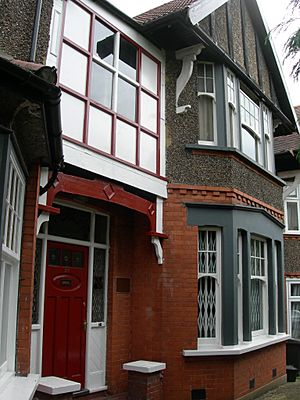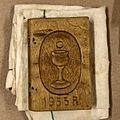Francis Skaryna Belarusian Library and Museum facts for kids
Quick facts for kids Francis Skaryna Belarusian Library and Museum |
|
|---|---|
 |
|
| Country | England |
| Type | Research reference, community |
| Established | 15 April 1971 |
| Location | North Finchley |
| Access and use | |
| Circulation | No lending services |
| Population served | Researchers, Belarusian community and anyone interested in Belarus |
| Other information | |
| Director | Governed by the Board of Trustees |
| Staff | Supported by volunteers |
| Website | http://www.skaryna.org |
The Francis Skaryna Belarusian Library and Museum is a special place in north London, England. It's the only library outside of Belarus that focuses entirely on collecting books and items about Belarus. People often call it the Skaryna Library or Skarynaŭka.
This library officially started in 1971. It is run by a group that helps good causes. The library has been very important for learning about Belarus in the United Kingdom and other countries since the 1950s. It worked with groups like the Belarusian Catholic Mission and the Anglo-Belarusian Society.
The library is named after Francysk Skaryna. He was a pioneer in publishing books in Belarusian and other East-Slavic languages.
Contents
What You Can Find Here
The Library's Books
The library has a huge collection of books, with over 30,000 volumes! Most of these books are about Belarusian history, literature, language, and culture. Many are in the Belarusian language, but you can also find books in Russian, Polish, German, and other languages.
The library has one of the best collections of books published by Belarusians living outside Belarus after World War II. It also has about 20 very old books from before 1800. These include copies of the Statut of the Grand Duchy of Lithuania. There are also old New Testaments and prayer books printed in Belarus. The library also has many copies of old Belarusian writings on microfilms.
Since the 1950s, the library has collected nearly 200 different magazines and newspapers. These include publications from western Belarus and from Belarusian communities around the world.
Maps and Music
The library has a collection of over 100 maps. Some of these maps are from the 1500s!
If you love music, you'll find a great collection of Belarusian music records. These include LPs, and some cassettes and CDs from the 1990s and 2000s. The music covers folk, rock, and classical styles.
The Archive
The archive is like a special storage for important historical papers. It holds Church documents from the 1700s and 1800s. You can also find materials from the time of the Belarusian Democratic Republic (1918).
The archive also keeps papers from Belarusian groups and famous people from all over the world. It has many old handwritten documents, some from the 1400s. There's also a large collection of photographs. Most of these photos show Belarusian life in the United Kingdom and other countries.
The Museum Collection
The museum is in one room of the library building. It has special items like Słuckija pajasy. These are beautiful belts from the 1700s, woven with gold and silk thread. There's also a priest's special robe made from similar belts.
You can see old coins from the Grand Duchy of Lithuania. There are also temporary banknotes issued in 1918 in Belarusian cities when there was no central government. The museum also has postage stamps from Belarus from 1918–1922. You can also see Soviet stamps with Belarusian designs.
The museum displays Belarusian religious art. It also has personal items from famous people. For example, there's a box that priest Jazep Hiermanovic used in a Soviet concentration camp.
Art Gallery
The library and the Belarusian Catholic Mission also have a collection of paintings. These artworks are by Belarusian artists. Some of the artists include Boris Zaborov, Piotra Sierhijevič, and Ivonka Survilla.
What the Library Does
The Francis Skaryna Belarusian Library and Museum is mainly a research library. This means it's a place where people can study and learn. It's open to researchers and guests who want to visit or take a tour. The library can even help visiting researchers with a place to stay and visa support.
The library also hosts many events. These include public talks and online events. They even have Wikipedia edit-a-thons, where people work together to improve Wikipedia articles. There's also a Belarusian readers' group, which is like a book club. The library helps organize the yearly Conference on Belarusian Studies.
How the Library Started
The library's collection began in 1947. That's when the Belarusian Catholic Mission started in London. In 1948, they moved to Marian House. There, a small but valuable collection of Belarusian books was kept. These books were brought to England by Father Česlaus Sipovič.
The library became a place for students to study and meet. Many scholars interested in Belarusian history used it. By 1957, the book collection had grown ten times bigger! It also started getting all the main newspapers and magazines from the BSSR and Belarusian communities abroad.
In 1958, the collection was named Bibliotheca Alboruthena. That same year, Father Leo Garoshka joined the community. He brought his own private library, which had many rare books. This made the Bibliotheca Alboruthena the largest Belarusian library in Western Europe. People from all over the world often donated books and items.
In 1960, Father Česlaus Sipovič became a Bishop. Father Leo Garoshka then became the librarian. In the 1960s, they started to organize and list all the books.
By 1968, the collection had over 6,500 books. More and more people in British universities were becoming interested in Belarusian studies. So, it was decided to buy a whole building just for the library. This new building would also house the archive and a small museum. In 1969, Ceslaus Sipovich, Auberon Herbert, and Paval Navara raised money to buy a building in North London.
The library officially opened on May 15, 1971. Father Alexander Nadson became the librarian. At first, a board of governors managed the library. In 1979, the library became a Charitable Trust. This meant it was run by a board of trustees. These trustees included priests, members of the Belarusian community, and British scholars. Bishop Česlaus Sipovič was the chairman until he passed away in 1981. Father Alexander Nadson then took over as chairman.
The library was created to help people research Belarus. Its main goal was to collect all materials about Belarus and make them available to anyone interested. By 1991, it had over 12,000 titles. It received almost all new Belarusian publications. In 1990, the library started exchanging books with the National Academy of Sciences of Belarus Library in Minsk. This helped them get rare old publications. Many people also donated books.
For many years, Professor Adam Maldzis from Minsk helped the library by sending books and magazines from Belarus.
The library has also organized several international meetings and conferences about Belarusian studies.
Around 2011, the library faced some challenges. However, in 2014, the Board of Trustees met again to bring the institution back to life. They updated the library's goals. Now, besides collecting and preserving Belarusian heritage, the library also aims to help the Belarusian community in Britain. It also wants to encourage British people to learn about Belarus. In 2015, the library received a new charity registration, showing its renewed importance.
Since then, the library has started to list and digitize its most valuable books and items. It also holds many events and works with other institutions in Belarus and other countries.
Image gallery
-
Father Alexander Nadson and Ivonka Survilla in 2010.
See also
- Belarusians in the United Kingdom







